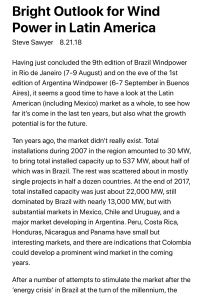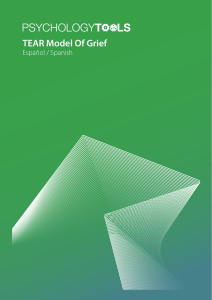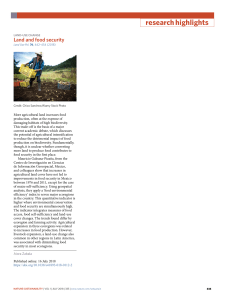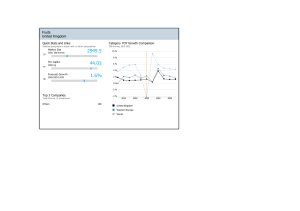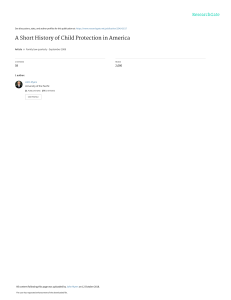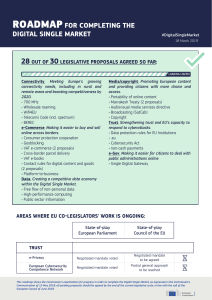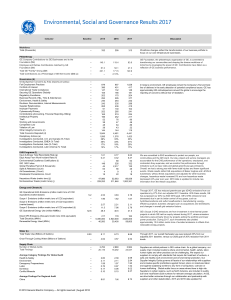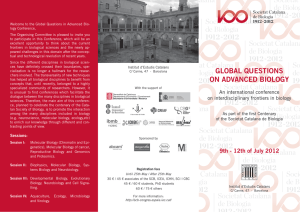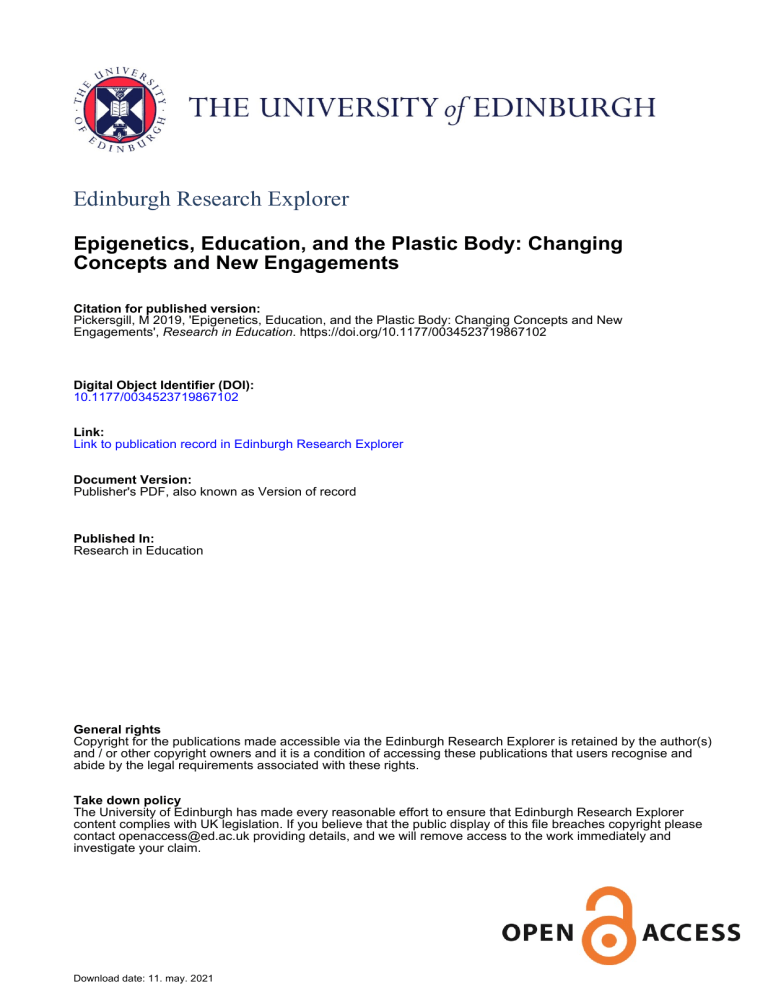
Edinburgh Research Explorer Epigenetics, Education, and the Plastic Body: Changing Concepts and New Engagements Citation for published version: Pickersgill, M 2019, 'Epigenetics, Education, and the Plastic Body: Changing Concepts and New Engagements', Research in Education. https://doi.org/10.1177/0034523719867102 Digital Object Identifier (DOI): 10.1177/0034523719867102 Link: Link to publication record in Edinburgh Research Explorer Document Version: Publisher's PDF, also known as Version of record Published In: Research in Education General rights Copyright for the publications made accessible via the Edinburgh Research Explorer is retained by the author(s) and / or other copyright owners and it is a condition of accessing these publications that users recognise and abide by the legal requirements associated with these rights. Take down policy The University of Edinburgh has made every reasonable effort to ensure that Edinburgh Research Explorer content complies with UK legislation. If you believe that the public display of this file breaches copyright please contact [email protected] providing details, and we will remove access to the work immediately and investigate your claim. Download date: 11. may. 2021 Special Issue: Education, Biosocial Sciences, and the Popular Imagination Epigenetics, education, and the plastic body: Changing concepts and new engagements Research in Education 0(0) 1–12 ! The Author(s) 2019 Article reuse guidelines: sagepub.com/journals-permissions DOI: 10.1177/0034523719867102 journals.sagepub.com/home/rie Martyn Pickersgill Centre for Biomedicine, Self & Society, The University of Edinburgh, UK Abstract Epigenetic processes, and the investigative practices that take these as their focus, are of increasing interest to a range of professionals beyond biomedicine. This has been piqued by, especially, the belief that bioscientific research is demonstrating new molecular mechanisms through which the social and physical environment impact upon the bodies of humans and other animals. Beyond the laboratory, epigenetic notions are entangled with wider ideas about the malleability of the soma (e.g., relating to neuroscience). In many contexts (including, to an extent, education), this intertwinement has contributed to producing and valourising a conception of a particularly plastic body. In this paper, I draw on a range of biomedical and education-related texts in order to outline and reflect upon the notions of ‘education’ and ‘epigenetics’ that are supported through and propelled by an array of writings that, to greater or lesser extents, bring these spheres of praxis into conversation. Discussions of epigenetics and stress, for instance, are framing certain kinds of educational work (e.g., with new parents) as a means of intervening in soma and society. In so doing, they implicitly extend ideas about what education is and what it can do. On the other hand, writings from educational researchers, for example, are enrolling epigenetic findings and ideas to support various positions or approaches. Many education researchers will be sceptical of some of the more hyperbolic assertations made about the significance of epigenetics. However, the fact that a nascent discourse connecting education and epigenetics is emerging is suggestive of a need for reciprocal, thoughtful, and critical exchange with bioscientists who seek to address educational issues, or whose work is being enrolled by others to do so. Keywords Epigenetics, biosocial, science and technology studies, sociology of education, sociology Corresponding author: Martyn Pickersgill, Centre for Biomedicine, Self & Society, The University of Edinburgh, Edinburgh, UK. Email: [email protected] 2 Research in Education 0(0) Introduction Epigenetic factors, as one review article in a contested epistemic space recently put it, ‘comprise the layer of regulatory information that is superimposed on the DNA sequence and imparts cell-type-specific function’ (Skvortsova et al., 2018: 1). Philosopher Maurizio Meloni and sociologist Ruth Müller (2018: 1) have observed that research on epigenetics has begun to explore ‘how environmental exposures and life experiences such as food, toxins, stress or trauma can shape trajectories of human health and well-being in complex ways’. Inspired by such research, if not always closely predicated on it, there exists today a notion held by a range of actors that bioscientific research on epigenetics is generating new insights into the molecular mechanisms through which the social and physical environment impact upon the bodies of humans and other animals. Studies of epigenetics can, at least to an extent, be regarded as affirming a malleable vision of ‘embedded bodies’ (Niewöhner, 2011) that are always and essentially situated within and remade through particular social milieu. When such investigations transcend the physical and discursive limits of biomedical spaces, the language of epigenetics commonly comes to be mixed with additional understandings of how bodies and subjectivities can be reshaped through physical and interpersonal context (e.g., from neurobiology) (Pickersgill, 2018). This onto-epistemic mixing can, in some places and in certain contexts, result in a conception of a body that is flexible and plastic. Social theorist Nikolas Rose (2013: 5) has asserted that ‘in the age of genomics and epigenomics, the old tropes of biological or genetic determinism can no longer be scientifically supported’. It is, according to Rose, shifts such as this that ‘offer the opportunity for a new relationship between the human sciences and the life sciences’ (Rose, 2013: 5). However, it is not entirely clear that tropes of determinism have been as devastatingly impactful as has regularly been assumed. Of course, deterministic ideas about genetics have clearly circulated within society – as has often been evident within the print media (Nerlich et al., 2002). Still, ‘complex and dynamic accounts of disease’ commonly exist that resist straightforward characterisation as genetically determinist (Weiner et al., 2017: 989). Conversely, it is not self-evident that renderings and readings of epigenetics always contain the nuance advocates of such research for enriching social science and theory might wish. Specifically, Waggoner and Uller (2015: 177) have shown that epigenetics is ‘often couched in language as deterministic as genetics research in both science and the popular press’. How the work of epigenetics researchers is received, though, largely remains an open question (though see Lappé, 2016; Stelmach and Nerlich, 2015). It is to this wider empirical agenda – i.e., the charting of how ideas about epigenetics function within societies – that this paper contributes. Specifically, I track some of the ways in which epigenetic findings and concepts are invoked within discourse emerging from, seeking to address, and enjoining interventions based on education (as a field and set of practices). The writings of Gulson and Pickersgill 3 Webb (2017, 2018) provide one pivot for this analysis, through their reflections on the potential for a new molecular biopolitics to reshape the aims and functions of education policy (see also Gulson and Baker, 2018). I also take analytic cues from research in science and technology studies (STS) concerned with how biological investigations, the biological per se, and their instantiations within society are imagined and articulated (e.g., Jasanoff and Kim, 2015; Müller and Samaras, 2018; Tutton, 2014). In what follows, I outline and reflect upon the notions of ‘education’ and ‘epigenetics’ that are supported through and propelled by an array of writings that, to greater or lesser extents, bring these spheres of praxis into conversation. My analysis draws on targeted searches of the biomedical, social work, and educational literature, as well as of other texts such as blogs and popular magazines. It is further grounded in my ongoing STS research examining the social lives of neuroscience and epigenetics. Overall, I aim to illustrate the diversity of discourses emerging at the interface of epigenetics and education, while also demonstrating the various constructions of biology, development, adversity, and social practices that are implied or directly posited in order to support these engagements. Environment, adversity, and care In a notable analysis of the varieties of epigenetics literature, Pinel et al. (2018) parsed epigenetics research into four primary subfields: gene expression, molecular epigenetics, clinical epigenetics, and epigenetic epidemiology. Scientists have focussed particularly on cancer (Martin, 2015), and considerable promise has been invested in therapeutic possibilities in this area (Pickersgill et al., 2013). The pharmaceutical giant GlaxoSmithKline (2018), for instance, is currently focussing its oncology pipeline on three domains, one of which is epigenetics. In part due to the investments and developments in cancer research around epigenetics, scientists attentive to other conditions are also becoming increasingly interested in the possibilities of using epigenetic mechanisms as treatment targets. The field of Alzheimer’s disease research, for example, is one in which hopes are actively being constituted (e.g., Caraci et al., 2013). Chiapperino and Testa (2016: 203) have explored how epigenetic technoscience is beginning to articulate with wider sociotechnical imaginaries of personalised medicine, with implications for the ‘roles and obligations of citizens, patients and health-care actors’. Entwined within as well as sited beyond epistemic collectives focussed on specific diseases, there is a growing interest in environmental epigenetics. Studies in this vein seek ‘to understand how interactions between the environment and the genome can lead to epigenetic modifications that affect gene expression’ (Müller et al., 2017: 1677). In this respect, work on rat pup-licking behaviour (Weaver et al., 2004) is widely cited and discussed, both inside and distant from canonical biomedical discourse (Kenney and Müller, 2017; Müller et al., 2017). Specifically, Weaver et al. (2004: 847) demonstrated that different levels of pup-licking and grooming, and ‘arched-back nursing’, by rats resulted ‘in differences in DNA 4 Research in Education 0(0) methylation’ in off-spring that ‘persisted into adulthood’, and that these were ‘potentially reversible’. Weaver et al. presented this kind of nursing and grooming as positive maternal care, associated with a decrease in anxious behaviour in their pups. As Kenney and Müller (2017: 23) have illustrated, this research has formed part of a web of studies, within which everyday ‘assumptions about sex, gender, sexuality, and class are present in the design, interpretation, and dissemination of experiments on the epigenetic effects of maternal care’. Drawing on work in environmental epigenetics, some have called for members of their professional groups to become conversant with the insights from epigenetics; social work, for instance (see Werner-Lin et al., 2016). However, the extent to which claims from such areas of research are beginning to find their way into public health advisories has been raised as a concern by a range of biomedical scientists, social scientists, and ethicists (Juengst et al., 2014; Mansfield, 2012; Müller et al., 2017). This is not least given the often stereotyped assumptions located within the ‘dense speculative crosstraffic between epigenetic studies in rodents and psychological and epidemiological studies in humans’ (Kenney and Müller, 2017: 23) vis-à-vis maternal (including gestational) effects on the developing foetus and infant (Richardson et al., 2014). Research in environmental epigenetics has also been entwined within neurobiological research in order to promote a range of understandings about the links between environments, bodies, and minds. This includes relations between stress, epigenetics, brains, and life chances (e.g., Wallack and Thornburg, 2016). In this regard, adverse childhood experiences have been described in various review articles and commentaries as contributing, in part through particular patterns of methylation, to the development of a neural architecture wherein ‘resilience is decreased and vulnerability is increased’ (McEwen, 2016: 59). Within such writings, targeted psychosocial interventions are commonly presented as opening ‘a window for plasticity’ (McEwen, 2016: 61), in order to promote health. Onto-epistemic narratives of this kind situate the developing child as at risk of biological insult through environmental adversity, while also remaining optimistic about the possibilities of intervention given the somatic malleability that is foregrounded through intersecting accounts of epigenetics and neurobiology. Relatedly, interventions that are ultimately aimed at enhancing the resilience of children are sometimes constructed through this logic as usefully including educational interventions with parents, with the aim of promoting their knowledge of infant development (for discussion, see Masten, 2018). As an example, social work professor Terri Combs-Orme has argued in a review article on epigenetic effects that, among other interventions, ‘parent support and training can provide nurturing care to infants who have been exposed to high stress since conception and can reverse some of the negative effects on their stress response systems’ (Combs-Orme, 2013: 29). This resonates with other social work and policy discourse which has biologised adversity and individualised parents as guardians of children’s brains and ameliorators of purported biosocial pathologies (Gillies et al., 2018). More generally, Müller and Samaras (2018: 726) have observed through their Pickersgill 5 sociological work on the epigenetics of ageing that ‘teaching lifestyle habits’ and informing young adults ‘about healthy parenting practices, particularly with regard to early life nutrition’ are also on occasion envisioned as potential interventions within biomedical discourse. Educational practices, then, have sometimes come to be framed as a means of effecting positive changes to the bodies of children that will enhance their ‘life chances’, as a consequence of the assumed psychosocial modifications such parental education will enjoin. While these interventions are being framed as socially and politically progressive, as social psychologist and bioethicist Ilina Singh (2012: 315) notes, any ‘programme of maternal support and education based around epigenetic theories deserves some scrutiny’. This is particularly important given the deeply troubling history of enrolling biological science within programmes of social policy (Rose and Rose, 2014; see also Gillies et al., 2018). Some bioethical scholarship has advanced similar accounts to social work scholars like Combs-Orme (e.g., Vears and D’Abramo, 2018), drawing on (for instance) Rawlsian philosophy to propel explicitly normative arguments about the need ‘to tackle epigenetic disadvantage’ (Loi et al., 2013: 151). Loi and colleagues have invoked the findings of researchers such as biomedical scientists and epidemiologists McGuiness et al. (2012) to support their position. These scientists specifically noted that ‘each additional year of education’ of the 239 men and women in Scotland they sampled for their research was ‘associated with 2.4% [. . .] greater global DNA methylation content’ (McGuiness et al., 2012: 155). Various other studies have also indicated correlations between methylation patterns and education (e.g., King et al., 2015; Tehranifar et al., 2013; van Dongen et al., 2018), but the limitations of these findings have been highlighted by some study authors. Tehranifar et al. (2013: 26), for instance, stated that their ‘results must be interpreted with caution’ and ‘may reflect spurious influences’. In noting the studies of McGuiness et al. (2012) and others, I am not seeking to argue for the relevance and veracity of this particular kind of epigenetic research to both philosophy and policy (indeed, I remain sceptical about this). Rather, my point is that such work has begun to be put to use as part of claims-making about the need to address disadvantage: epigenetics is being actively made by various scholars to speak to societal concerns, shaping the emerging sociotechnical imaginary of epigenetics within educational and social policy discourses (Pickersgill, 2018). Epigenetics, learning, and education In the previous section, I highlighted some of the scientific discourse on epigenetics, including introducing the field of environmental epigenetics. I underscored the ways in which findings and notions from this area of research have been enrolled to develop particular conceptions of the nature of development and adversity, and to enjoin specific forms of educational action as a way of intervening in bodies and social life. In this section, I want to move closer to learning and education per se, 6 Research in Education 0(0) noting first the emergence of interests in learning and memory within biomedical writings on epigenetics, and then the role of epigenetic processes within arguments and policy and society made by education scholars. Neurobiological work on the epigenetic processes associated with learning and memory formation has become more visible in recent years (reviewed by, among others, Colciago et al., 2015; Guan et al., 2015; Jarome and Lubin, 2014). Following this, a nascent literature is emerging that is considering the links between epigenetic processes and learning. One opinion piece by biologist Birgitta Mc Ewen argued that ‘[m]ore and more studies point to the importance of epigenetic processes in learning and memory formation’ (Mc Ewen, 2015: 110). Indeed, Mc Ewen (2015: 110) feels ‘we are at the starting-point of understanding how conditions like stress and physical exercise might influence learning through epigenetic mechanisms’. Building on this claim, she then argues that it is ‘important that the key principles of epigenetic processes and its consequences for individuals and society are understood by school staff and school policy-makers’ (Mc Ewen, 2015: 110). Through the idiom of ‘starting-point’, Mc Ewen contributes to constructing a ‘promissory imaginary’ (Groves et al., 2018: 153) of epigenetics that will inevitably yield significant truths, while simultaneously configuring educationalists as straightforward beneficiaries of these (cf. Pickersgill, 2011). In other words, Mc Ewen takes for granted that epigenetic research will advance in ways that will be important for education, and that educationalists should be receptive to emergent insights. In so doing, the complexities of both epigenetics and education are elided. Within the relatively limited writings in this area (compared to neuroscience and education, for instance), there is some evidence of similar kinds of ‘speculative cross-traffic’ that Kenney and Müller (2017: 23) have demonstrated as being constitutive of discourse on epigenetics and maternal behaviour. A striking example of this is a paper by Abel and Rissman (2013). In this, a study of rats, the authors remarked that their ‘results suggest that, similar to an adult, the hippocampus and cerebellum of adolescent brain may also be primed for facilitated learning and memory by increased H3 acetylation in response to exercise’ (Abel and Rissman, 2013: 388). Based on these findings in their animal model, they then make a marked ontological shift to ‘hypothesize that epigenetic mechanisms, involving many of the genes assessed here, are essential for the positive affects [sic] of exercise on behavior and suspect these data have relevance for adolescent boys’ (Abel and Rissman, 2013: 382). Similar to Mc Ewen, the authors assert rather than argue for the wider relevance of their work, through discursive links that would likely be less easily forged in the absence of the wider excitement and attribution of import and novelty that epigenetics research has attracted (as discussed in the Introduction and the previous section). Such ostensibly surprising shifts from delineated rat behaviours to constellations of human practices are not entirely uncommon within the more speculative work of some scientists concerned with epigenetics. A further notable example is the prominent McGill-based geneticist Mosche Szyf (a senior author on the aforementioned Weaver et al. study), who has theorised in various arenas about the implications of Pickersgill 7 epigenetics for thinking about human actions and societies. In one paper, Szyf et al. (2008: 47) drew on evidence from mouse and rat models to argue that ‘epigenetics provides a mechanism to explain interindividual variations in human behavior and behavioural pathologies, and links social and chemical environmental exposures to behavioral and physiological outcomes’. In another article, Szyf and Patrick McGowan drew together various data from animal and human models, and layered over various postulations until they were in a rhetorical position to propose that ‘understanding the epigenetic consequences of social exposures stands not only to revolutionize medicine but also to transform social sciences and humanities as well’ (McGowan and Szyf, 2010: 71; see also Szyf et al., 2016). Given such hyperbole, and the epistemic authority that comes with Szyf’s institutional position, the projections advanced by other scientists and non-scientists seem more understandable – if no less demanding of qualification and enjoining of critique. Within educational discourse specifically, some scholars have begun to enrol epigenetic concepts and findings as a means of supporting wider claims about the need to combat the structural injustices inherent to so much educational practice. Sociologists Samuel Lucas and Lauren Beresford (2010: 61), for instance, have drawn on epigenetic research to argue that ‘it appears that social factors, including education, not only may nurture native ability, but they may cause the very native ability they later nurture’. They put this research to work in order to dismiss biological determinism, and as part of a broader argument in support of egalitarian social policy for education. This is a similar strategy to that employed in other contexts vis-à-vis not only epigenetics but also neurobiology, as highlighted in the previous section: i.e., the enrolment of ostensibly novel bioscience to support non-deterministic yet still highly biological accounts of subjectivities as a route to calling for some kind of policy and/or practice innovation (Broer and Pickersgill 2015; Pickersgill, 2018). Stronger claims still have been made more by psychologist Angeline Stoll Lillard at the University of Virginia. In a recent article, Lillard reflected on the ‘fascinating possibility’ that the Montessori approach to education ‘leads to epigenetic changes in children that predict a wide array of better life outcomes’ (Lillard, 2018: 395). Lillard (2018: 399) noted the Weaver et al. pup-licking study as a ‘seminal contribution’ to epigenetics, and described how she and colleagues had begun to study ‘whether deep concentration in Montessori children leads to demethylation of the oxytocin receptor gene’. In her article, work in environmental epigenetics is directly leveraged as an explanatory mechanism for a particular mode of educational practice, and is accounted for as an animating force for Lillard’s own epigenetics research. Again, then, we can see how epigenetics can be deployed to support different kinds of notions about the value, future, and ontologies of education, as a means of layering veracity over what in this case is a field of practice subject to long-standing contestation (Brehony, 2000). More self-consciously dynamic accounts of the role of epigenetics in and for education have been advanced by sociologist of education Deborah Youdell and collaborators. She has put forward programmatic arguments, for instance, about 8 Research in Education 0(0) the need for sociologists of education to ‘engage with bioscience to interrogate the folding together of the social, cultural, biographical, pedagogic, political, affective, neurological, and biological in the interactive production of students and learning’ (Youdell, 2017: 1273–1287). In relation to stress specifically, Youdell et al. (2018: 219) have argued that there is a need for ‘transdisciplinary connectivity’ in order to better comprehend the ontology, action, and implications of school-related stress, in ways that would fruitfully entwine biological (including epigenetic) and social approaches to research. Mixing together ideas, approaches, and methods from epigenetics and established approaches to education research can, from Youdell’s perspective, help to ‘pose new types of questions’ and ‘offer profound new insights into the making of inequality’ (Youdell, 2016: 52; see also Youdell and Lindley, 2018). In this respect, Youdell is already beginning to move away from the nascent tendency of education-related scholars to buttress claims-making with recourse to epigenetic notions, and towards the reciprocally affecting styles of bio/social science engagement advocated by scholars such as Rose (2013). Conclusions Beyond (and, indeed, often within) the laboratory, epigenetic notions are entangled with other ideas about the malleability of the soma (e.g., relating to neuroscience). In many contexts, this intertwinement has contributed to producing and valourising a conception of a particularly plastic body. This is a body that is highly reactive to external stimuli, becoming intimately moulded through the diverse features of the biopsychosocial milieu in which it is embedded. Slowly yet visibly, discourses from a variety of sites are engaging and shaping notions of epigenetics and education, for which this plastic body plays an anchoring role. Discussions of epigenetics and stress, for instance, are framing certain kinds of educational work (e.g., with new parents) as a means of intervening in soma and society. In so doing, they implicitly extend ideas about what education is and what it can do. On the other hand, writings from educational researchers, for example, are enrolling epigenetic findings and ideas to support various positions or approaches. These contribute to a vision of biology that aligns closely to often pre-existing ideas about the Good Society and the kinds of policies and practices necessary to reach this. Through disparate writings, then, epigenetics and education are increasingly being made relevant to one another. Such relevance should not be taken for granted, but is itself a discursive and interactional achievement (see, relatedly, Pickersgill, 2011). In a more normative vein, there are – as Gulson and Baker (2018: 160) suggest – questions to be asked about what the ‘implications [are] for contemporary educational researchers’ taking findings and concepts from epigenetics and treating them ‘as more insightful, as permanent, as more ‘‘real’’ or enduring than something else’. These questions are perhaps especially prescient given the tendency of a minority of biologists to make surprising and sometimes problematic ontological moves from specific behaviours in rats to assemblages of actions and ideas in humans when theorising about the import of epigenetics for education and beyond. Concerns Pickersgill 9 about biologists over-stating the import of epigenetics to education, or around the blithe attribution of veracity to emergent bioscience as a rhetorical strategy on the part of educationalists, should not prohibit explorations of productive rapprochements between these spheres of praxis (see e.g., Youdell and Lindley, 2018). What remains clear, however, is that if biological and education researchers are going to be increasingly wading into each other’s waters, substantive, thoughtful, and self-critical dialogue between them is surely warranted. Declaration of conflicting interests The author(s) declared no potential conflicts of interest with respect to the research, authorship, and/or publication of this article. Funding The author(s) disclosed receipt of the following financial support for the research, authorship, and/or publication of this article: This paper draws on research funded by the Wellcome Trust [grant numbers 209519/Z/17/Z; 103917/Z/14/Z]. ORCID iD Martyn Pickersgill https://orcid.org/0000-0001-9807-9148 References Abel JL and Rissman EF (2013) Running-induced epigenetic and gene expression changes in the adolescent brain. International Journal of Developmental Neuroscience 31: 382–390. Brehony KJ (2000) Montessori, individual work and individuality in the elementary school classroom. History of Education 29: 115–128. Broer T and Pickersgill M (2015) Targeting brains, producing responsibilities: The use of neuroscience in British social policy. Social Science & Medicine 132: 54–61. Caraci F, Leggio GM, Drago F, et al. (2013) Epigenetic drugs for Alzheimer’s disease – Hopes and challenges. British Journal of Clinical Pharmacology 75: 1154–1155. Chiapperino L and Testa G (2016) The epigenomic self in personalized medicine: Between responsibility and empowerment. The Sociological Review 64(Suppl. 1): 203–220. Colciago A, Casati L, Negri-Cesi P, et al. (2015) Learning and memory: Steroids and epigenetics. Journal of Steroid Biochemistry & Molecular Biology 150: 64–85. Combs-Orme T (2013) Epigenetics and the social work imperative. Social Work 58: 23–30. Gillies V, Edwards R and Horsley N (2018) Brave new brains: Sociology, family and the politics of knowledge. Sociological Review 64: 219–237. GlaxoSmithKline (2018) GSK reaches agreement to acquire TESARO, an oncology focused biopharmaceutical company. Press Release issued 3 December 2018. Available at: www.gsk.com/en-gb/media/press-releases/gsk-reaches-agreement-to-acquiretesaro-an-oncology-focused-biopharmaceutical-company/ (accessed 19 July 2019). Groves C, Sankar M and Thomas PJ (2018) Second-generation biofuels: Exploring imaginaries via deliberative workshops with farmers. Journal of Responsible Innovation 5: 149–169. 10 Research in Education 0(0) Guan J-S, Xie H and Ding X (2015) The role of epigenetic regulation in learning and memory. Experimental Neurology 268: 30–36. Gulson KN and Baker B (2018) New biological rationalities in education. Discourse: Studies in the Cultural Politics of Education 39: 159–168. Gulson KN and Webb PT (2017) Emerging biological rationalities for policy: (molecular) biopolitics and the new authorities in education. In: Parker S, Gulson KN and Gale T (eds) Policy and Inequality in Education, Education Policy & Social Inequality, Vol. 1. Singapore: Springer, pp. 23–39. Gulson KN and Webb PT (2018) Life’ and education policy: Intervention, augmentation and computation. Discourse: Studies in the Cultural Politics of Education 39: 276–291. Jarome TJ and Lubin FD (2014) Epigenetic mechanisms of memory formation and reconsolidation. Neurobiology of Learning and Memory 115: 116–127. Jasanoff S and Kim S-H (2015) Dreamscapes of Modernity: Sociotechnical Imaginaries and the Fabrication of Power. Chicago: University of Chicago Press. Juengst ET, Fishman JR, McGowan ML, et al. (2014) Serving epigenetics before its time. Trends in Genetics 30: 427–428. Kenney M and Müller R (2017) Of rats and women: Narratives of motherhood in environmental epigenetics. BioSocieties 12: 23–46. King K, Muprhy S and Hoyo C (2015) Epigenetic regulation of newborns’ imprinted genes related to gestational growth: Patterning by parental race/ethnicity and maternal socioeconomic status. Journal of Epidemiology and Community Health 69: 639–647. Lappé M (2016) Epigenetics, media coverage, and parent responsibilities in the post-genomic era. Current Genetic Medicine Reports 4: 92–97. Lillard AS (2018) Rethinking education: Montessori’s approach. Current Directions in Psychological Science 27: 395–400. Loi M, Del Savio L and Stupka E (2013) Social epigenetics and equality of opportunity. Public Health Ethics 6: 142–153. Lucas SR and Beresford L (2010) Naming and classifying: Theory, evidence, and equity in education. Review of Research in Education 34: 25–84. Mc Ewen B (2015) Epigenetics and learning. Trends in Neuroscience and Education 4: 108–111. McEwen BS (2016) In pursuit of resilience: Stress, epigenetics, and brain plasticity. Annals of the New York Academy of Sciences 1373: 56–64. McGowan PO and Szyf M (2010) The epigenetics of social adversity in early life: Implications for mental health outcomes. Neurobiology of Disease 39: 66–72. McGuiness D, McGlynn LM, Johnson PCD, et al. (2012) Socio-economic status is associated with epigenetic differences in the pSoBid cohort. International Journal of Epidemiology 41: 151–160. Mansfield B (2012) Race and the new epigenetic biopolitics of environmental health. BioSocieties 7: 352–372. Martin P (2015) Comprehending the body in the era of the epigenome. Current Anthropology 56: 151–177. Masten AS (2018) Resilience theory and research on children and families: Past, present, and promise. Journal of Family Theory & Review 10: 12–31. Meloni M and Müller R (2018) Transgenerational epigenetic inheritance and social responsibility: Perspectives from the social sciences. Environmental Epigenetics 4: dvy019doi:10.1093/eep/dvy019. Pickersgill 11 Müller R, Hanson C, Hanson M, et al. (2017) The biosocial genome? Interdisciplinary perspectives on environmental epigenetics, health and society. EMBO Reports 18: 1677–1682. Müller R and Samaras G (2018) Epigenetics and aging research: Between adult malleability and early life programming. BioSocieties 13: 715–736. Nerlich B, Dingwall R and Clarke DD (2002) The book of life: How the completion of the Human Genome Project was revealed to the public. Health 6: 445–469. Niewöhner J (2011) Epigenetics: Embedded bodies and the molecularisation of biography and milieu. BioSocieties 6: 279–298. Pickersgill M (2011) Connecting neuroscience and law: Anticipatory discourse and the role of sociotechnical imaginaries. New Genetics and Society 30: 27–40. Pickersgill M, Niewöhner J, Müller R, et al. (2013) Mapping the new molecular landscape: Social dimensions of epigenetics. New Genetics & Society 32: 429–447. Pickersgill M (2018) The value of the imagined biological in policy and society: Somaticizing and economizing British subject(ivitie)s. In: Gibbon S, Prainsack B, Hilgartner S, et al. (eds) Handbook of Genomics, Health and Society. London: Routledge, pp. 99–107. Pinel C, Prainsack B and McKevitt C (2018) Markers as mediators: A review and synthesis of epigenetics literature. BioSocieties 13: 276–303. Richardson SS, Daniels CR, Gillman MW, et al. (2014) Don’t blame the mothers. Nature 512: 131–132. Rose N (2013) The human sciences in a biological age. Theory, Culture & Society 30: 3–34. Rose H and Rose S (2014) Genes, Cells, and Brains: The Promethean Promises of the New Biology. London: Verso. Singh I (2012) Human development, nature and nurture: Working beyond the divide. BioSocieties 7: 308–321. Skvortsova K, Iovino N and Bogdanović O (2018) Functions and mechanisms of epigenetic inheritance in animals. Nature Reviews Molecular Cell Biology 19: 774–790. Stelmach A and Nerlich B (2015) Metaphors in search of a target: The curious case of epigenetics. New Genetics and Society 34: 196–218. Szyf M, McGowan P and Meaney MJ (2008) The social environment and the epigenome. Environmental and Molecular Mutagenesis 49: 46–60. Szyf M, Tang Y-Y, Hill KG, et al. (2016) The dynamic epigenome and its implications for behavioral interventions: A role for epigenetics to inform disorder prevention and health promotion. Translational Behavioral Medicine 6: 55–62. Tehranifar P, Wu H-C, Fan X, et al. (2013) Early life socioeconomic factors and genomic DNA methylation in mid-life. Epigenetics 8: 23–27. Tutton R (2014) Genomics and the Reimagining of Personalized Medicine. Abingdon: Routledge. van Dongen J, Bonder MJ, Dekkers KF, et al. (2018) DNA methylation signatures of educational attainment. NPJ Science of Learning 3(7). Available at: https://www.nature.com/articles/s41539-018-0020-2. Vears DF and D’Abramo F (2018) Health, wealth and behavioural change: An exploration of role responsibilities in the wake of epigenetics. Journal of Community Genetics 9: 153–167. Waggoner M and Uller T (2015) Epigenetic determinism in science and society. New Genetics and Society 34: 177–195. Wallack L and Thornburg K (2016) Developmental origins, epigenetics, and equity: Moving upstream. Maternal and Child Health Journal 20: 935–940. 12 Research in Education 0(0) Weaver ICG, Cervoni N, Champagne FA, et al. (2004) Epigenetic programming by maternal behavior. Nature Neuroscience 7: 847–854. Weiner K, Martin P and Tutton R (2017) Have we seen the geneticisation of society? Expectations and evidence. Sociology of Health & Illness 39: 989–1004. Werner-Lin A, McCoyd JLM, Doyle MH, et al. (2016) Leadership, literacy, and translational expertise in genomics: Challenges and opportunities for social work. Health & Social Work 41: e52–e59. Youdell D (2016) A biosocial education future? Research in Education 96: 52–61. Youdell D (2017) Bioscience and the sociology of education: The case for biosocial education. British Journal of Sociology of Education 38: 1273–1287. Youdell D and Lindley MR (2018) Biosocial Education: The Social and Biological Entanglements of Learning. Abingdon: Routledge. Youdell D, Harwood V and Lindley MR (2018) Biological sciences, social sciences and the languages of stress. Discourse: Studies in the Cultural Politics of Education 39: 219–241.
